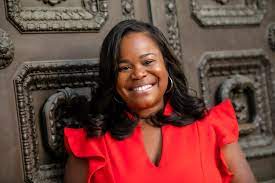Black-Press Group Opposes Ban on Menthol:
Issues Involve Tobacco Money, Police Misconduct
Percent of Black, Latino TV News Directors Rises
Peabodys Honor ‘Facing Race’ for Public Service
Migrant Voices Missing in TV Coverage of Border
Black News Channel to Reach Nearly 60 Million
For a Startup, ‘The 19th’ Has a Lot of Entree
Smartphones Are Just the Latest Witness to Terror
For Rodgers, Key Was Listening, Really Listening
Berkeley J-School Hires Two Women of Color
How Indian Country Today Came Roaring Back
Zimbabwe Releases N.Y. Times Freelancer
Short Takes
Support Journal-isms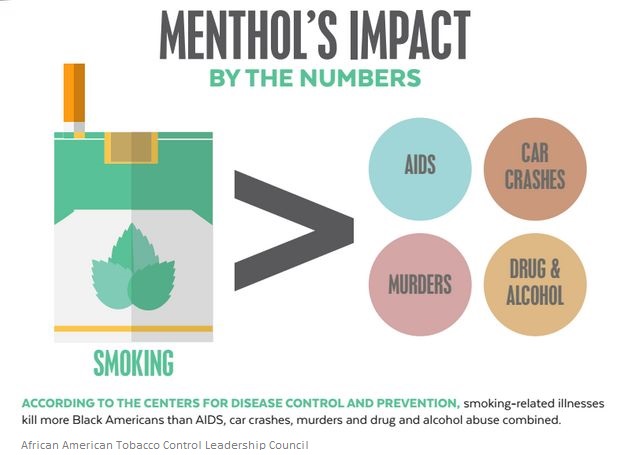
Issues Involve Tobacco Money, Police Misconduct
June 29 update: A divided D.C. Council voted Tuesday to ban the sale of flavored tobacco products in the District, including menthol cigarettes, Julie Zauzmer reported for the Washington Post. The 8-to-5 vote was the council’s second in favor of the legislation, meaning that it now heads to the desk of Mayor Muriel E. Bowser , who supports the ban for health reasons and is expected to sign it into law. Benjamin F. Chavis Jr., president of the National Newspaper Publishers Association, told Journal-isms by telephone that NNPA’s position opposing the ban has not changed, saying its enforcement would have a negative effect on African Americans.
The trade organization representing the Black press, which has received thousands of dollars from the tobacco industry, is opposing a proposed ban on menthol cigarettes, the overwhelming choice of Black smokers.
The Food and Drug Administration has cited a study asserting that a U.S. menthol ban would prompt 923,000 smokers to quit, including 230,000 African Americans, in the first 13 to 17 months after a ban was enacted.
However, the National Newspaper Publishers Association, backed by some Black and Hispanic law enforcement executives, argues that criminalizing the cigarettes would only lead to more clashes among Blacks, Hispanics and police. And Benjamin F. Chavis Jr., president of the NNPA, says “this is not about money,” but about unintended consequences. A black market in menthol cigarettes could lead to confrontations with police that could have deadly consequences, he told Journal-isms by telephone on Monday.
Still, the issue is economic on many fronts, as well as one of health, public safety and social justice. As the Campaign for Tobacco-Free Kids has noted, “Since the 1960s, the tobacco industry has supported the National Newspaper Publishers Association (NNPA), a trade association representing more than 200 African American-owned community newspapers. The most recently available financials show that Reynolds gave over $225,000 to the NNPA in 2017.”
Big Tobacco spends millions to support Black organizations. A further financial consideration: For a local jurisdiction such as the District of Columbia, a ban would cost $13.9 million in lost revenue and implementation costs over the next four years, according to the city’s chief financial officer.
While a national issue, the June 13 NNPA statement was specifically weighing in on proposed legislation in D.C. to end the sale of flavored tobacco products – including flavored e-cigarettes, menthol cigarettes and flavored cigars. Two days later, the D.C. Council voted preliminarily for the ban, 9-3-1.
The bill still has to go through second reading and secure Mayor Muriel Bowser’s signature.
“Importantly, the bill will be enforced in ways that protect against any potential law enforcement abuse. The bill’s committee report and fiscal impact statement both make clear that DC’s Department of Consumer and Regulatory Affairs – not the police – will enforce the new law and that enforcement will only be on retailers, not individual consumers,” the Campaign for Tobacco-Free Kids noted.
The NNPA statement argued that “the unintended consequences of such a racially discriminatory ban will set the stage for more negative and more likely counterproductive interactions between law enforcement and people of color.”
“ ‘Banning menthol is not going to make the demand for menthol products go away. We know this because illegal drugs are used by people in every community in every state across this country,’ Sgt. Anthony Miranda (Ret. NYPD), national chairperson, National Latino Officers Association (NLOA), said in the NNPA statement. “ ‘When there is a high demand, an illegal market will fill the void, if a legal, regulated market does not. Bans and prohibitions don’t work. They actually create crime,’ stated Miranda. Crime always requires police resources to enforce, otherwise, a ban on the sale of menthol cigarettes would be meaningless.”
The issue has split Black organizations. According to the Campaign for Tobacco-Free Kids, the NAACP, the National Urban League and Delta Sigma Theta sorority have urged the U.S. Food and Drug Administration to prohibit menthol cigarettes.
The campaign also says, “Overall, 85 percent of African-American smokers smoke menthol cigarettes. This preference for menthol cigarettes is the direct result of a decades-long marketing campaign by the tobacco industry. The marketing of menthol cigarettes to the African-American community dates back to at least the 1950s,” chronicling the efforts with such marketing tools as the Kool Jazz Festival.
But “the tobacco industry has supported historically African American colleges and universities as far back as the 1890s when R.J. Reynolds helped to finance the founding of Winston Salem State University. However, industry documents reveal the companies’ true intentions in forming these relationships. . . . “
This is why we protest, the El Paso shooter literally killed kids and women, Eric garner allegedly sold lose cigarettes. Ones dead and the other is taken into custody. pic.twitter.com/jmdHqoCxeh
— Mikah AKA Mike Baggz (@MikeBaggz) August 4, 2019
The campaign also said, “Recently, R.J. Reynolds funded the National Action Network, a civil rights organization founded by Reverend Al Sharpton, to conduct community forums to build opposition to local action to prohibit menthol cigarettes. These forums attempted to frame the issue as criminalization of the African American community, ignoring the devastating impact of the tobacco industry’s targeted marketing and the public health benefits of prohibiting menthol.”
Sharpton, founder of the network and an MSNBC host, has opposed a New York City bill that would ban flavored tobacco products, including menthol cigarettes. He said his opposition is based on his own experiences with police. “He points to the case of Eric Garner, an African American man who died in 2014 after a cop put him in a chokehold while arresting him for allegedly selling untaxed cigarettes,” the Washington Post reported in 2019. “Recently, Garner’s mother also denounced the proposed ban.”
The criminalization argument won the day in New York, where menthol cigarettes were eliminated from its ban on flavored e-cigarettes.
In the state capital of Albany, N.Y., legislation to get menthol cigarettes off the shelves has stalled.
However, in April, the FDA announced that on the federal level, it will ban all menthol cigarettes and flavored cigars.
“It’s not clear when the ban will go into effect,” Nicholas Florko reported for STAT News.
Percent of Black, Latino TV News Directors Rises
“The annual RTDNA/Newhouse School at Syracuse University Newsroom Survey shows that the gap in representation between the overall U.S. population and the local news workforce has been slowly shrinking, but TV news is still less diverse by 12.2 percentage points and radio news lags by 15.4 percentage points,” the Radio Television Digital News Association reported Wednesday.
“The latest edition of the annual local newsroom survey shows that:
- “People of color make up 27.7% of the local TV news workforce, up 1.1 percentage points from last year’s record high.
- “This year’s survey recorded the most TV news directors of color ever, at 20.3%.
- “For the sixth year in a row, there is a new record high percentage of TV news directors who are women, and for the first time in more than 25 years of the annual survey, all local TV newsroom respondents have women on the news team.
- “Radio newsrooms reached the second highest percentage of people of color ever – but nearly 85% of the radio news workforce is still white.
- “Fewer than half of radio news staffs include any women at all, up slightly from last year, especially smallest markets. Overall, women are just under 40% of the radio workforce, down slightly in the last year.”
The summary continued, “According to the Bureau of Labor Statistics, the U.S. workforce is 17% Hispanic, 13% African American, 6% Asian American, 1% Native American. In local TV, the workforce is 12.2%, Hispanic/Latino, 12.3% African American, 2.8% Asian American and 0.4% Native American.”
In addition, “This year’s survey recorded the most news directors of color ever, beating last year’s record high by about three percentage points. Five of the six best years for representation among news directors have been in the last six years, but still just one in five news directors are people of
color. That’s more than seven percentage points behind representation among the total local TV
workforce, and nearly 20 percentage points behind the overall U.S. workforce.
“This year saw all-time highs for African American news directors (6.5%) and Hispanic/Latino
(10.3%) news directors. However, excluding Spanish-language stations, Hispanic news
directors lost ground. At non-Spanish language stations, 15.6% of news directors are people of
color, beating 2018’s high.”
Peabodys Honor ‘Facing Race’ for Public Service
“KING, Tegna’s NBC affiliate in Seattle, earned a 2020 Peabody Award in the Public Service category for Facing Race, a 13-week original series that tackled the difficult topic of systemic racism in the Pacific Northwest,” Paul Greeley reported Thursday for TVNewsCheck.
“Facing Race is one of 30 award winners, selected from a pool of 60 nominees, from nearly 1,300 entries from around the world.
“Overseen by the University of Georgia’s Grady College of Journalism and Mass Communication, the Peabody Awards annually honor the most powerful, enlightening and invigorating stories in television, radio and digital media. . . .
” ‘Our goal when starting the series was to have no holds barred discussions about race and racial issues — and our team did just that in a groundbreaking way,’ says Laura Evans, KING’s interim news director.
“Facing Race was a weekly broadcast that tackled issues of race, social injustice and racial inequality in the Pacific Northwest. The half-hour episodes aired every Sunday over 13 weeks, covering a wide range of subjects — from racial disparities in education, health and policing to environmental racism, land inequity and immigration.”
Among other winners, listed by Patrick Hipes of Deadline, were PBS’ “Frontline” for “Whose Vote Counts”; Renee Tajima-Peña’s PBS docuseries “Asian Americans”; Ava DuVernay’s Array collective which received an Institutional Award; “Immigration Nation,” a six-part documentary for Netflix by Christina Clusiau and Shaul Schwarz on the Immigration and Customs Enforcement agency (ICE); and “Crip Camp,” airing on Netflix, a film by Nicole Newnham and James LeBrecht featuring summer campers who became key players and activists in the disability rights movement.
Also, the Washington Post podcast “Post Reports: The Life of George Floyd”; ITV’s “Muslim in Trump’s America”; Vice on Showtime’s “Losing Ground,” in which “Correspondent Alzo Slade explores how a little-known type of ownership known as ‘heirs property’ leaves African Americans especially vulnerable to losing their property,” and the “Floodlines” podcast from The Atlantic, “a comprehensive story of Hurricane Katrina and its social, cultural, psychological, political, economic, and environmental aftermath and impact.”
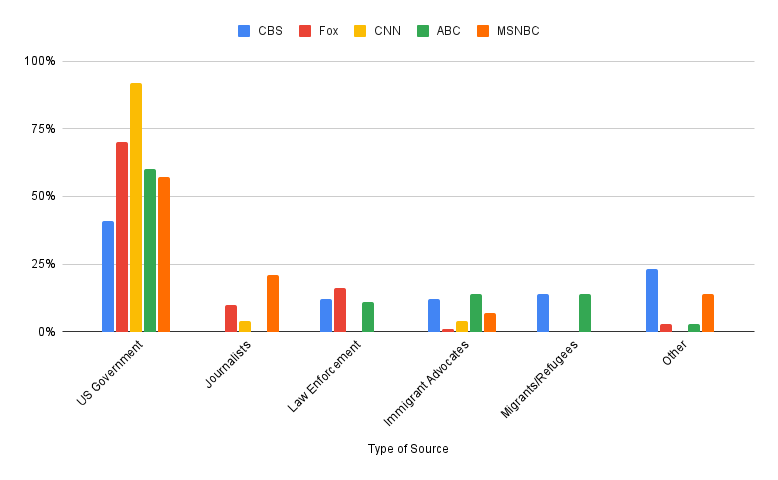
Migrant Voices Missing in TV Coverage of Border
“A new FAIR study finds that TV news coverage of the southern US border largely ignores the experiences and voices of those most impacted by the immigration system,” Ada Rajkovic reported Saturday for Fairness & Accuracy In Reporting.
“Despite the Biden administration’s promise of a more humane immigration approach, thousands of children continue to be detained at the border. The issue has gotten widespread media attention, but in a highly sensationalized manner that lacks critical analysis as well as historical context. . . .
“FAIR studied the coverage of migration at the US southern border on five major evening TV news shows: CNN’s Situation Room, ABC World News Tonight, Fox News Special Report, MSNBC‘s The Beat and CBS Evening News, from March 14 to April 14.
“Over this period, these five shows featured 194 sources over 60 segments on the border issue. (Several of these were repeat appearances by the same guests; we counted 113 unique sources total.)
“Most sources — 122, or 63% — were current or former US government officials. Of these government sources, 66% were Democrats, mostly from the Biden administration: The top three sources were Joe Biden, with 18 appearances, White House press secretary Jen Psaki with 14 and Homeland Security Secretary Alejandro Mayorkas with 12.
“While migrants and refugees were frequently shown on air, only 11 migrant/refugee sources were heard from—a total of 6% of all sources. Three of the migrant/refugee sources were unnamed. Notably, the migrant/refugee voices had hardly any dialogue. Most interactions were translations of short answers, such as ‘a lot of dangers here in Mexico’ (Gustavo Mendez, CBS 3/22/21) or ‘a better life for your children’ (unnamed Guatemalan woman, CBS, 3/23/21). . . .”
“The news shows routinely referred to the border situation as a ‘crisis,’ using the word at least once in 40 out of 60 segments to describe the border situation. Much of the conversation revolved around which administration — Trump’s or Biden’s — was to blame for it. . . . None of the few migrant voices that made it on air supported this blame game, and instead spoke about the oppressive conditions they were fleeing, and those they continued to endure. . . .”
Black News Channel to Reach Nearly 60 Million
“BNC (Black News Channel) has reached a carriage agreement with Verizon Fios TV, extending the reach of the African-American targeted news channel to nearly 60 million linear cable subscribers, both parties announced Wednesday,” R. Thomas Umstead reported for nexttv.com.
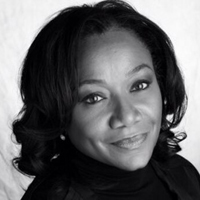 “The deal allows BNC, which launched in February 2020, to reach more than 3.7 million Verizon Fios TV subscribers. Verizon is the latest linear distributor to carry BNC, joining Comcast, DirecTV, Charter Communications and Dish Network, according to the channel. BNC offers coverage of the unique perspectives, challenges and success of Black and brown communities. . . .”
“The deal allows BNC, which launched in February 2020, to reach more than 3.7 million Verizon Fios TV subscribers. Verizon is the latest linear distributor to carry BNC, joining Comcast, DirecTV, Charter Communications and Dish Network, according to the channel. BNC offers coverage of the unique perspectives, challenges and success of Black and brown communities. . . .”
Separately, the channel appointed veteran media executive Vickie Burns (pictured), most recently news director at WPIX New York, senior vice president of content, Mark K. Miller reported June 17 for TVNewsCheck.
- Black News Channel: BNC Raises The Bar On Juneteenth Coverage To Create Premier TV Destination For Emancipation Day Celebrations (June 14)
- Michael Harriot, The Root: Black News Channel Broadcasts Heinous Double Murder on Live Television
For a Startup, ‘The 19th’ Has a Lot of Entree
“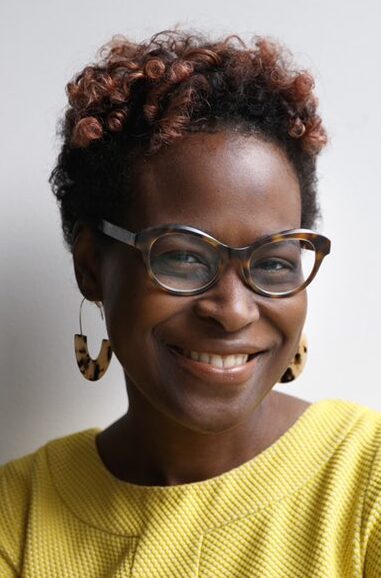 During a live interview with the reporter ERRIN HAINES (pictured) last month, Energy Secretary JENNIFER GRANHOLM divulged that the women of President JOE BIDEN’s Cabinet had discussed getting together for dinner or drinks ‘once Covid calms down just a bit more,’ ” Alex Thompson and Theodoric Meyer wrote June 15 for Politico’s “West Wing Playbook.”
During a live interview with the reporter ERRIN HAINES (pictured) last month, Energy Secretary JENNIFER GRANHOLM divulged that the women of President JOE BIDEN’s Cabinet had discussed getting together for dinner or drinks ‘once Covid calms down just a bit more,’ ” Alex Thompson and Theodoric Meyer wrote June 15 for Politico’s “West Wing Playbook.”
“ ‘Maybe we’ll invite you one time, Errin,’ Housing and Urban Development Secretary MARCIA FUDGE, one of three Cabinet secretaries being interviewed, said with a laugh.
“Haines hasn’t gotten a dinner invite… yet.
“But the offer still underscores how much of an impression The 19th, the gender- and politics-focused news site where Haines is an editor-at-large, has made on the Biden administration.
“Haines landed the first interview last year with KAMALA HARRIS after Biden chose her as his running mate — which Harris said at the time was deliberate. ‘On purpose my first interview as a teammate and a running mate with Joe Biden is with the 19th,’ she said in the interview.
“Haines also secured Harris’ first sit-down interview with a national outlet after she took office. She was the first reporter to interview Fudge after Biden nominated her last year, and she and her colleagues have sat down with many of the top-ranking women in the administration, including Commerce Secretary GINA RAIMONDO, Interior Secretary DEB HAALAND, climate adviser GINA McCARTHY and White House press secretary JEN PSAKI. . . .”
Allissa V. Richardson wrote “Bearing Witness While Black: African Americans, Smartphones, & the New Protest #Journalism.”
Smartphones Are Just the Latest Witness to Terror
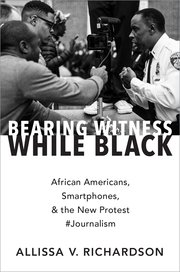 A book described as “the first book of its kind to identify three overlapping eras of domestic terror against African American people — slavery, lynching and police brutality — and explain how storytellers during each period documented its atrocities through journalism” has been honored twice by the Association for Education in Journalism and Mass Communication, a leading organization of journalism educators.
A book described as “the first book of its kind to identify three overlapping eras of domestic terror against African American people — slavery, lynching and police brutality — and explain how storytellers during each period documented its atrocities through journalism” has been honored twice by the Association for Education in Journalism and Mass Communication, a leading organization of journalism educators.
“Bearing Witness While Black: African Americans, Smartphones, & the New Protest #Journalism” by Allissa V. Richardson of the University of Southern California won the 2021 James Tankard Book Award and the 2021 Frank Luther Mott/Kappa Tau Alpha Research Award.
 Others on the lengthy list of winners included Omar Jimenez (pictured) of CNN, AEJMC First Amendment Award; Earnest Perry, University of Missouri, 2021 Lionel C. Barrow Jr. Award for Distinguished Achievement in Diversity Research and Education; University of Missouri School of Journalism, 2021 AEJMC Equity and Diversity Award;
Others on the lengthy list of winners included Omar Jimenez (pictured) of CNN, AEJMC First Amendment Award; Earnest Perry, University of Missouri, 2021 Lionel C. Barrow Jr. Award for Distinguished Achievement in Diversity Research and Education; University of Missouri School of Journalism, 2021 AEJMC Equity and Diversity Award;
Also, Gabrielle Gurley, The American Prospect, 2021 Gene Burd Award for Excellence in Urban Journalism Studies: Jinx Coleman Broussard, Louisiana State University, AEJMC History Division Donald L. Shaw Senior Scholar Award; Louisa Ha, Bowling Green State; Eleanor Blum Distinguished Service to Research Award; Sharon Bramlett-Solomon, Arizona State University, 2021 Dorothy Bowles Public Service Award.
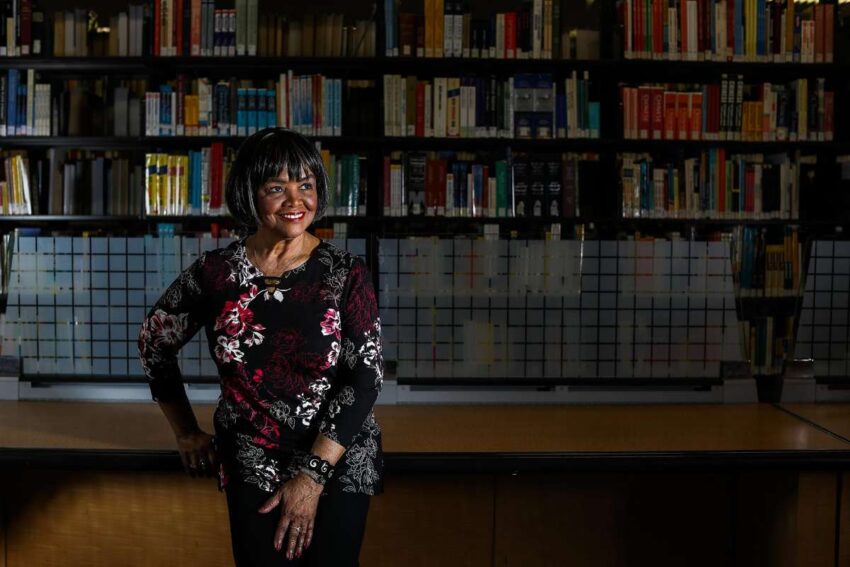
For Rodgers, Key Was Listening, Really Listening
“You have eight Emmy awards, you’ve interviewed stars, you’ve been viewed by millions of people throughout your career. What do you think your greatest contribution to the world has been?” Mya Vinnett asked legendary Bay Area broadcaster Barbara Rodgers for the San Francisco Chronicle’s “Lift Every Voice” series.
The series, part of a national effort, connects young Black journalists with Black elders in their communities to celebrate and learn from their life experiences.
Rodgers replied, “Listening and hearing what people have (been saying) for a long time, and nobody was listening. That’s the main thing: listening. Paying attention to what you hear and not going to a story thinking you already know the story, because sometimes you miss what really is the story, if you go in with your mind made up. Some of the stories that I got awards for or got nominated for awards were stories that had been done as throwaway stories by other people, and I saw something different in them.”
Rodgers also discusses growing up in Knoxville, Tenn., and her first job in Rochester, N.Y., where she was the first woman and first Black person hired in the news department at her station.
Oprah Winfrey and Hearst Magazines teamed up for interviews that pair young Black journalists with elders who include civil rights activists, celebrities and others sharing some lessons learned in life. The San Francisco Chronicle is a Hearst newspaper.
Readers are asked to support the National Association of Black Journalists and the National Caucus & Center on Black Aging.
- Spencer Whitney, San Francisco Chronicle: Lift Every Voice: A conversation with Bay Area Black leaders (video)
Berkeley J-School Hires Two Women of Color
 “Berkeley Journalism is proud to announce that it has hired two talented journalists and educators, both women of color, onto its prestigious faculty after a nationwide search,” the UC Berkeley Graduate School of Journalism said June 17.
“Berkeley Journalism is proud to announce that it has hired two talented journalists and educators, both women of color, onto its prestigious faculty after a nationwide search,” the UC Berkeley Graduate School of Journalism said June 17.
“The hiring of Lisa Armstrong (pictured above) and Shereen Marisol Meraji (below) reflect the School’s goal of taking the limits off who gets to be a journalist by impacting who trains and mentors them.
 “Both women will teach courses exploring the history of reporting on race as well as core classes in the School’s foundational reporting and writing curriculum. They will also develop publishing projects with students, building on the School’s focus on creating opportunities for students to get their work published during their time at Berkeley Journalism.
“Both women will teach courses exploring the history of reporting on race as well as core classes in the School’s foundational reporting and writing curriculum. They will also develop publishing projects with students, building on the School’s focus on creating opportunities for students to get their work published during their time at Berkeley Journalism.
“Lisa Armstrong, an award-winning multimedia journalist and editor with credits in The Intercept, The New Yorker, Rolling Stone, HuffPost, and CBS News, will join the faculty July 1. She has collaborated with musicians, dancers and spoken word poets to bring journalism to live audiences. . . .”
How Indian Country Today Came Roaring Back
“The publication Indian Country Today, founded in 1981, will celebrate its 40th anniversary this year. That might be an unremarkable fact, except for one detail — it very nearly failed to get there,” Steve Dubb reported June 16 for Nonprofit Quarterly. “Indeed, on September 4, 2017, the publication shut down, seemingly for good.
“Today, the story couldn’t be more different. As Sara Shahriari of the Institute for Nonprofit News (INN) noted at the organization’s annual conference last week, the publication now attracts over 400,000 readers a month, while broadcasting on television to two dozen stations. Speaking at the INN conference, editor Mark Trahant, Shoshone-Bannock, told how the publication has come roaring back. . . .”
- Karen Fischer, The Verge: The Airwaves of Navajo Nation
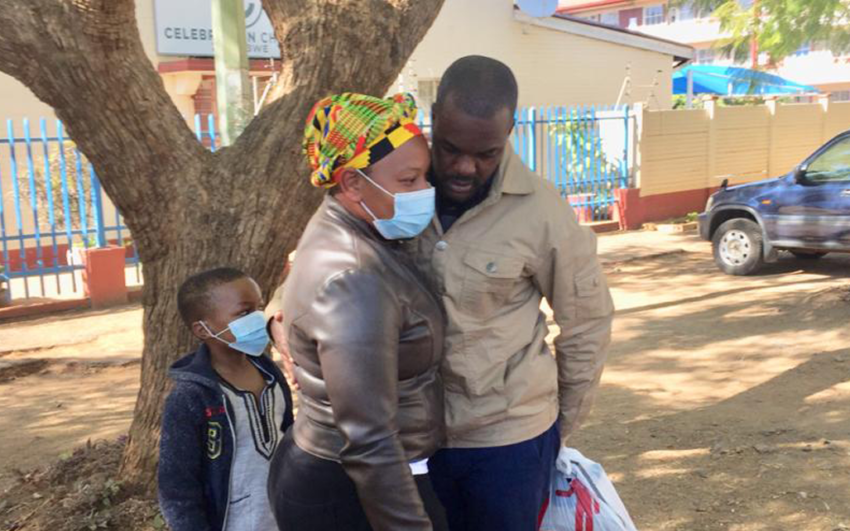
Zimbabwe Releases N.Y. Times Freelancer
“Journalist Jeffrey Moyo, who freelances for The New York Times, was finally released on Wednesday after a hiccup that kept him in jail a day longer as it emerged that prosecutors did not oppose his High Court bail appeal after admitting the State had a weak case,” Marshall Bwanya reported July 17 from Bulawayo, Zimbabwe, for zimlive.com.
“The National Prosecuting Authority (NPA) savaged magistrate Rachel Mukanga for ordering Moyo’s extended incarceration on the grounds he was facing serious State security charges, saying in court papers that “the trial magistrate misdirected herself when she made a finding that the applicant’s release will undermine public peace and security.”
John Eligon, now the New York Times Johannesburg bureau chief, covering southern Africa, added Wednesday, “The court’s decision to grant bail amounts to a temporary reprieve for Mr. Moyo, who will have to pay a bail fee of 5,000 Zimbabwean dollars, about $14, and surrender his passport among other restrictions because the charges against him — violating immigration rules by committing fraud to facilitate the entry of the reporters — are still pending, according to Douglas Coltart, one of his lawyers.
“The arrest of Mr. Moyo, 37, came amid other highly publicized cases of government attacks on journalists across Africa that have drawn widespread condemnation from news organizations and from press freedom advocates. In Ethiopia, journalists covering the war in the Tigray region have been arrested, threatened and had their press credentials revoked, including a freelance reporter for The Times. In February, the authorities in Mozambique expelled a British journalist covering a violent insurgency in the northern part of the country.”
- International Press Institute: U.S. journalist Nathan Maung released from Myanmar prison
- Jeffrey Moyo, Anadolu Agency, Turkey: Zimbabwe: ‘Press freedom suffers even after independence’ (March 5)
Short Takes
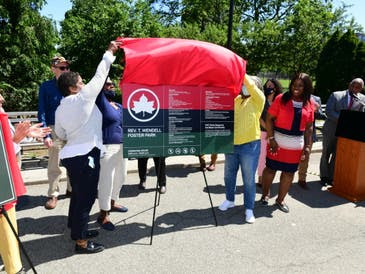
- “New York City announced Thursday that it’s renaming 16 of its parks and recreation areas to honor the legacies of 16 Black Americans,” Joshua Barajas wrote June 17 for the “PBS NewsHour.” “Among the luminaries being honored in the renamings — including Lena Horne, Malcolm X and Kwame Ture, all known for their civil rights activism — is the late PBS NewsHour co-anchor Gwen Ifill. Railroad Park in Queens, a 16-acre natural area that’s home to migratory birds, will be known as Gwen Ifill Park. . . .”
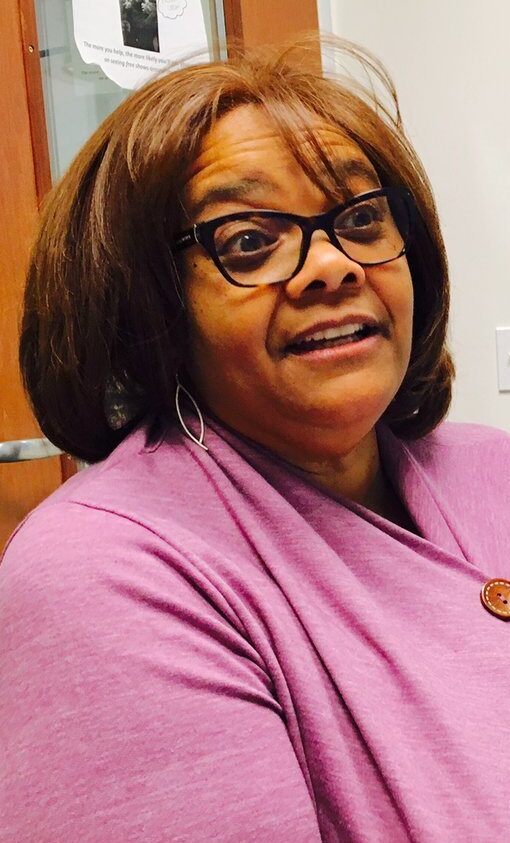 Columnist Dahleen Glanton (pictured) is among nearly 40 journalists who are leaving the Chicago Tribune’s newsroom as part of a voluntary buyout program announced late last month by Tribune Publishing, the Tribune reported. In a column Wednesday, Glanton, who has been at the Tribune 32 years, said her father “would be proud that in the increasingly unstable world of journalism, I hung in there for a total of 45 years. But he would be even prouder that when the time came to leave, I did it on my own terms.”
Columnist Dahleen Glanton (pictured) is among nearly 40 journalists who are leaving the Chicago Tribune’s newsroom as part of a voluntary buyout program announced late last month by Tribune Publishing, the Tribune reported. In a column Wednesday, Glanton, who has been at the Tribune 32 years, said her father “would be proud that in the increasingly unstable world of journalism, I hung in there for a total of 45 years. But he would be even prouder that when the time came to leave, I did it on my own terms.”
- “Jemele Hill is launching a podcast network exclusively with Spotify that will focus on elevating the voices and stories of Black women,” J. Clara Chan reported Tuesday for the Hollywood Reporter. “Taking its name from Hill’s hit podcast, Jemele Hill Is Unbothered, which was renewed for a third season Tuesday, The Unbothered Network will release original content exclusively on Spotify. Spotify, Hill and her production company Lodge Freeway Media will identify and develop series for the new podcast network. . . .”
- The Washington Post said Tuesday it is “thrilled to announce that Emmanuel Felton will join The Post’s America desk as its race and ethnicity reporter. Emmanuel comes to The Post from BuzzFeed News, where he has worked for nearly two years as an investigative reporter on the inequality desk. Within days of the Jan. 6 Capitol riot, Emmanuel unearthed a scoop about Black Capitol Police officers who said their superiors had failed to prepare them for the ferociousness of the rioters, who spewed racist abuse at them. And before Congress had even voted to recognize President Biden’s victory, Emmanuel filed a story noting that the mostly White insurrectionists appeared to have received kid-glove treatment from authorities.”
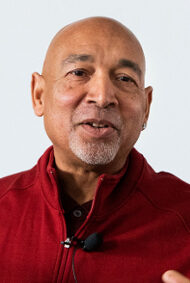 Derrick Z. Jackson (pictured) has won first place in the social justice category in the annual contest of the National Society of Newspaper Columnists. Jackson, a former columnist with the Boston Globe, was acclaimed for columns for the Union of Concerned Scientists and Grist. Jackson also won first place in the Sports category for pieces in The Undefeated, “Big-time colleges care more about money and winning than black athletes getting degrees” and “NCAA must stop perpetuating academic and financial disparities for HBCUs“
Derrick Z. Jackson (pictured) has won first place in the social justice category in the annual contest of the National Society of Newspaper Columnists. Jackson, a former columnist with the Boston Globe, was acclaimed for columns for the Union of Concerned Scientists and Grist. Jackson also won first place in the Sports category for pieces in The Undefeated, “Big-time colleges care more about money and winning than black athletes getting degrees” and “NCAA must stop perpetuating academic and financial disparities for HBCUs“
- “”Microsoft, Davis Wright Tremaine LLP, and the Reporters Committee for Freedom of the Press, are joining forces to develop a national pro bono media law network to support local journalists,” the Reporters Committee announced June 16. “With a $245,000 grant from the John S. and James L. Knight Foundation, they will seek to expand the Protecting Journalists Pro Bono Program, a pilot program launched last year by Microsoft and Davis Wright Tremaine. . . .”
- Coca-Cola North America Monday announced “plans to nearly double its spending with minority-owned media companies over the next three years. Black, Hispanic, and Asian-American and Pacific Islander (AAPI)-owned media companies and partners will account for 8% of the company’s total annual media budget in North America by 2024,” the company said. It also said, “In addition to building relationships with newer partners like Ebony/Jet, Revolt TV and My Cultura, Coca-Cola will continue its legacy of partnership with longstanding and highly influential multicultural media outlets like Essence and Univision. . . .” Callie Schweitzer added for LinkedIn News, “Coca-Cola’s announcement follows many others, including General Mills, L’Oréal USA, Target and Uber that committed to spending at least 2% of their annual media budgets with Black-owned media. Yet there’s skepticism among experts who say the industry’s previous promises often fall by the wayside.”
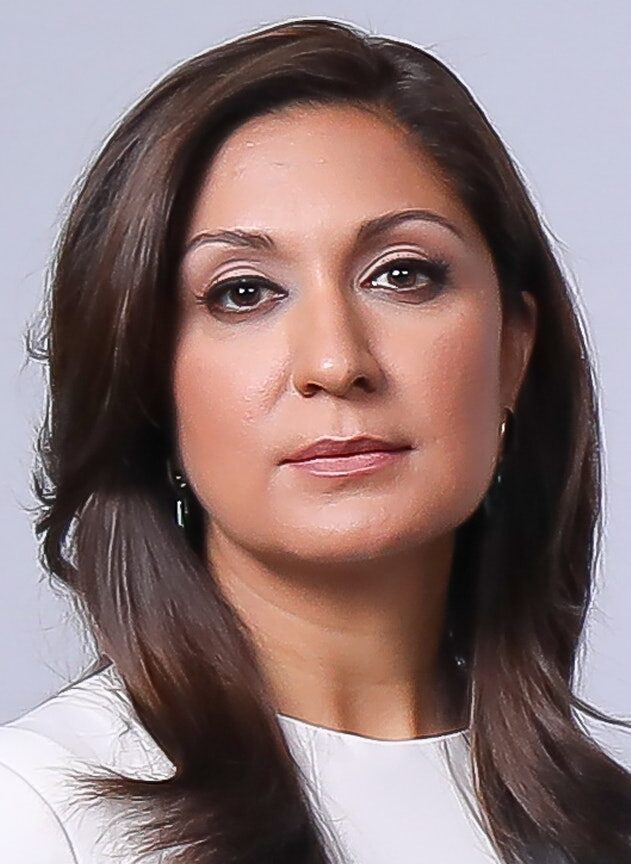 “PBS NewsHour senior national correspondent Amna Nawaz (pictured) has been named the nightly newscast’s chief correspondent, and on Fridays, she’ll also serve as the NewsHour’s White House correspondent,” A.J. Katz reported June 17 for Adweek. “Nawaz joined the PBS NewsHour in April 2018 as a correspondent and has since co-moderated PBS NewsHour’s Democratic Primary Debate with Politico in December 2019. In fact, Nawaz, who is Pakistani-American, is the first Asian American and Muslim American to moderate a presidential debate. . . .”
“PBS NewsHour senior national correspondent Amna Nawaz (pictured) has been named the nightly newscast’s chief correspondent, and on Fridays, she’ll also serve as the NewsHour’s White House correspondent,” A.J. Katz reported June 17 for Adweek. “Nawaz joined the PBS NewsHour in April 2018 as a correspondent and has since co-moderated PBS NewsHour’s Democratic Primary Debate with Politico in December 2019. In fact, Nawaz, who is Pakistani-American, is the first Asian American and Muslim American to moderate a presidential debate. . . .”
- “Now past his first 100 days, President Biden should focus his sights on naming a permanent chair for the Federal Communications Commission (FCC),” Andrew Barrett, former commission of the Federal Communications Commission, wrote June 16 for the Chicago Defender. Barrett also wrote, “Someone with authority needs to address the continued inequities for minorities in broadcast radio that I have attempted to remedy since my days as a Commissioner in the 1990s. . . .”
- “CBS Corp. persuaded a federal appeals court in Richmond, Va., to uphold its victory Wednesday against defamation claims brought by Virginia Lt. Gov. Justin Fairfax over the broadcaster’s 2019 news interviews with two women who accused him of sexual assault,” Mike Leonard reported for Bloomberg Law.
- “The statues unveiled last week in Newark, New Jersey, and Brooklyn, New York, that memorialize the final nine minutes of George Floyd’s life denigrate and diminish the reputation of black men,” columnist Jason Whitlock wrote Tuesday for the conservative Blaze Media under the headline, “Veneration of George Floyd is racist and must be stopped.” “George Floyd is a prop corporate media uses for attention, a pawn liberal politicians use to push policy, and a punching bag social activists use as a symbol to explain black people and promote themselves. . . .”
 “Michelle Lee (pictured), who has helped modernize and diversify Allure since becoming the magazine’s editor in chief in 2015, has announced she’ll be leaving the Condé Nast publication to join Netflix,” David Griner reported Tuesday for Adweek. She becomes the streaming service’s vice president of editorial and publishing.
“Michelle Lee (pictured), who has helped modernize and diversify Allure since becoming the magazine’s editor in chief in 2015, has announced she’ll be leaving the Condé Nast publication to join Netflix,” David Griner reported Tuesday for Adweek. She becomes the streaming service’s vice president of editorial and publishing.
- “While news reports and social media have perpetuated the idea that anti-Asian violence is committed mostly by people of color, a new analysis shows the majority of attackers are white,“ Kimmy Yam reported June 15 for NBC News. “Janelle Wong, a professor of American Studies at the University of Maryland, College Park, released analysis last week that drew on previously published studies on anti-Asian bias. She found official crime statistics and other studies revealed more than three-quarters of offenders of anti-Asian hate crimes and incidents, from both before and during the pandemic, have been white, contrary to many of the images circulating online. . . .”
- “The National Center on Disability and Journalism is now accepting entries for the 2021 Katherine Schneider Journalism Award for Excellence in Reporting on Disability, the only journalism contest devoted exclusively to disability coverage. Winners will receive a total of $8,000 in cash awards in large media and small media categories. First-place winners in each category will be awarded $2,500 and invited to give a public lecture for the Cronkite School in fall 2021. Second-place winners will receive $1,000 and third-place winners $500. . . .”
 Rachel Ramirez (pictured) has been named general assignment writer for a new global climate team announced Wednesday by CNN Worldwide President Jeff Zucker, A.J. Katz reported for TV Newser. “Ramirez will focus on breaking news, trending stories and deeply reported narratives that help CNN readers understand how the climate crisis affects all aspects of their lives. Ramirez joined CNN in early June after a year of freelancing, during which time she wrote for Vox, HuffPost, The Guardian and Grist. Ramirez also serves as the co-lead of the Asian American Journalists Association’s Pacific Islander Task Force.” Brandon Miller and Rachel Smolkin will lead the team.
Rachel Ramirez (pictured) has been named general assignment writer for a new global climate team announced Wednesday by CNN Worldwide President Jeff Zucker, A.J. Katz reported for TV Newser. “Ramirez will focus on breaking news, trending stories and deeply reported narratives that help CNN readers understand how the climate crisis affects all aspects of their lives. Ramirez joined CNN in early June after a year of freelancing, during which time she wrote for Vox, HuffPost, The Guardian and Grist. Ramirez also serves as the co-lead of the Asian American Journalists Association’s Pacific Islander Task Force.” Brandon Miller and Rachel Smolkin will lead the team.
- “In a special Dateline NBC airing this Friday at 10pm ET/9pm CT, Dateline correspondent Josh Mankiewicz will report on Shapearl Wells’ journey to find answers after her son was shot and killed in Chicago,” NBC News announced by email. “During the one-hour broadcast, Wells opens up about her son’s murder, as well as her podcast Somebody, which documented her own investigation into whether Chicago police detectives did enough to try to solve the case. During the special hour, Somebody, Dateline will also investigate why homicides involving Black victims are less likely to be solved, and look at the state of policing in America, including the relationship between the Chicago cops and the communities they police.” Preview

- “Sesame Workshop is building on recent content focusing on race and equality to launch Coming Together, a four-year project that will research and develop resources to teach children how to talk about race,” Anna Brugmann reported June 16 for Current. She also wrote, “For example, in a Sesame Street segment that appeared on the Workshop’s YouTube channel in March, Elmo talks about melanin with Wes and Elijah, two Black puppets added to the show this year. The objective was to give children language for why skin color differs. . . .”
- “Following a summer of protests against racial injustice, the Sacramento Bee was inspired to launch an Equity Lab, which includes a team of community-funded journalists focused on serving communities neglected by the mainstream media,” Evelyn Mateos wrote Friday for Editor & Publisher. She also wrote, “The Lab is led by editor Keiona Williamson. She is joined by Alex Yoon-Hendricks, an equity reporter; Marcus Smith, who will cover Sacramento County’s Black communities; Orizo Hajigurban, an engagement reporter; and Jeong Park, an economic mobility reporter. The team has covered issues like why Sacramento’s wealthiest areas are being vaccinated more than those hit the hardest, and the U.C. Davis Medical Center union’s fight for a higher housing stipend. At press time, the Lab is focusing on housing issues, such as affordability and quality of life. . . .”
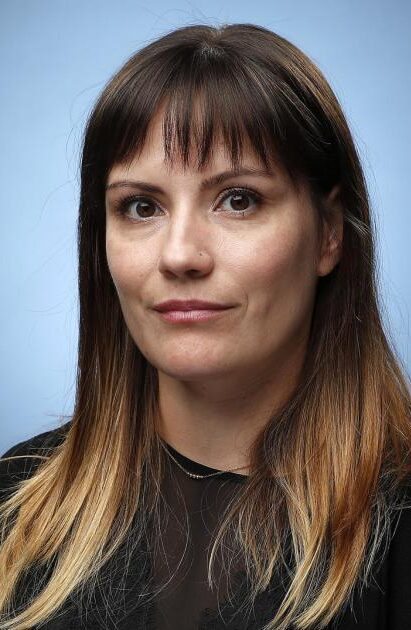 Nicole Santa Cruz (pictured). for eight years lead reporter for the Los Angeles Times’ Homicide Report, a database documenting each victim in the county, is leaving the beat to return to her home state of Arizona, she told readers Sunday. “Many times, people asked how I could write about such a sad topic. It’s because through people’s worst days, I witnessed their strength. They wanted to tell their loved ones’ stories; I just had the privilege of listening. Perhaps the most startling lesson from this reporting was not seeing how people mourn the dead but how they carry on with life. . . .”
Nicole Santa Cruz (pictured). for eight years lead reporter for the Los Angeles Times’ Homicide Report, a database documenting each victim in the county, is leaving the beat to return to her home state of Arizona, she told readers Sunday. “Many times, people asked how I could write about such a sad topic. It’s because through people’s worst days, I witnessed their strength. They wanted to tell their loved ones’ stories; I just had the privilege of listening. Perhaps the most startling lesson from this reporting was not seeing how people mourn the dead but how they carry on with life. . . .”
- Twenty years ago, Grover Gardner began narrating a series of comic mysteries whose title character is a white lawyer named Andy Carpenter, Laura Miller wrote Monday for Slate. Gardner also had to voice Carpenter’s partner, Willie Miller, a Black ex-con. “ ‘I probably modeled him on something I’d heard on television, on Hill Street Blues, or The Wire,’ Gardner said. Today, 14 books later, he’s still voicing Willie — but he’s changed his approach. ‘I’d think very hard about doing that kind of accent now,’ he said. In an era of heightened sensitivity to issues of representation and misrepresentation, it’s no longer acceptable to cast a white actor as a character of color in a movie or TV show. But audiobooks play by different rules. . . .”
 “On the cusp of its 18th birthday, Hyphen — a San Francisco-founded indie magazine dedicated to amplifying Asian American perspectives — received an unpleasant surprise,” Grace Z. Li and Ida Mojadad reported June 16 for sfweekly.com. “Andrew Kuo and Kareem Rahma — former executives at A+E Networks, the New York Times, and VICE — were launching Hyphen Media, a new podcasting company with considerable investor backing and a stunningly similar moniker and mission: to ‘tell colorful stories’ by underrepresented voices.” From the perspective of Karissa Chen, Hyphen’s editor-in-chief, “the overlapping name felt like a ‘slap in the face’ because the media company’s branding looked so similar to her own volunteer-led ‘scrappy’ magazine, to the point of confusing longtime readers who thought Hyphen was starting a podcast. That was not the case — Hyphen (the magazine) is not connected to Hyphen Media at all. . . .”
“On the cusp of its 18th birthday, Hyphen — a San Francisco-founded indie magazine dedicated to amplifying Asian American perspectives — received an unpleasant surprise,” Grace Z. Li and Ida Mojadad reported June 16 for sfweekly.com. “Andrew Kuo and Kareem Rahma — former executives at A+E Networks, the New York Times, and VICE — were launching Hyphen Media, a new podcasting company with considerable investor backing and a stunningly similar moniker and mission: to ‘tell colorful stories’ by underrepresented voices.” From the perspective of Karissa Chen, Hyphen’s editor-in-chief, “the overlapping name felt like a ‘slap in the face’ because the media company’s branding looked so similar to her own volunteer-led ‘scrappy’ magazine, to the point of confusing longtime readers who thought Hyphen was starting a podcast. That was not the case — Hyphen (the magazine) is not connected to Hyphen Media at all. . . .”
- Google told Reuters this week “it is developing an alternative to the industry standard method for classifying skin tones, which a growing chorus of technology researchers and dermatologists says is inadequate for assessing whether products are biased against people of color,” Paresh Dave reported Friday for Reuters.
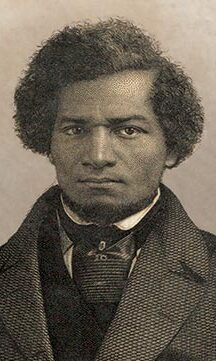 In addition to being a leading abolitionist and publisher of The North Star, Frederick Douglass (pictured) was a champion of Chinese and Japanese immigration, Raymond Douglas Chong wrote June 17 for AsAmNews. “At Boston, in his Composite Nation Speech (1869), Douglass eloquently argued for Chinese and Japanese immigration to America. He strongly declared America as a ‘composite nation’ with immigration as a fundamental human right,” Chong wrote. In the mid-19th century, “The Chinese unfortunately faced the ugly scourge of racism. The Whites bitterly harassed and attacked them across the American West. They cruelly called them as celestials and heathens, from an exotic land. They fervently called for their immigration and naturalization ban. The Anti-Chinese Sentiment of the Yellow peril was pervasive in American society. Very few American defended the civil rights of the Chinese. . . .”
In addition to being a leading abolitionist and publisher of The North Star, Frederick Douglass (pictured) was a champion of Chinese and Japanese immigration, Raymond Douglas Chong wrote June 17 for AsAmNews. “At Boston, in his Composite Nation Speech (1869), Douglass eloquently argued for Chinese and Japanese immigration to America. He strongly declared America as a ‘composite nation’ with immigration as a fundamental human right,” Chong wrote. In the mid-19th century, “The Chinese unfortunately faced the ugly scourge of racism. The Whites bitterly harassed and attacked them across the American West. They cruelly called them as celestials and heathens, from an exotic land. They fervently called for their immigration and naturalization ban. The Anti-Chinese Sentiment of the Yellow peril was pervasive in American society. Very few American defended the civil rights of the Chinese. . . .”
 “We are excited to announce that Karen Attiah (pictured) will be a Post columnist,” The Washington Post reported June 17. “In this role, she will be writing on race, international affairs, culture, and human rights. Based in her home state of Texas, she will be contributing to the new Voices Across America initiative. As the Post’s founding Global Opinions editor, Karen was responsible for recruiting and editing writers from around the world. A staunch human rights advocate, she has won awards for her pursuit of accountability after the murder of Post columnist Jamal Khashoggi. . . .”
“We are excited to announce that Karen Attiah (pictured) will be a Post columnist,” The Washington Post reported June 17. “In this role, she will be writing on race, international affairs, culture, and human rights. Based in her home state of Texas, she will be contributing to the new Voices Across America initiative. As the Post’s founding Global Opinions editor, Karen was responsible for recruiting and editing writers from around the world. A staunch human rights advocate, she has won awards for her pursuit of accountability after the murder of Post columnist Jamal Khashoggi. . . .”
- “Circle City Broadcasting’s CW affiliate WISH Indianapolis is adding former U.S. Surgeon General Dr. Jerome Adams to its medical reporting team as WISH-TV’s Medical Expert,” Mark K. Miller reported June 17 for TV News Check.
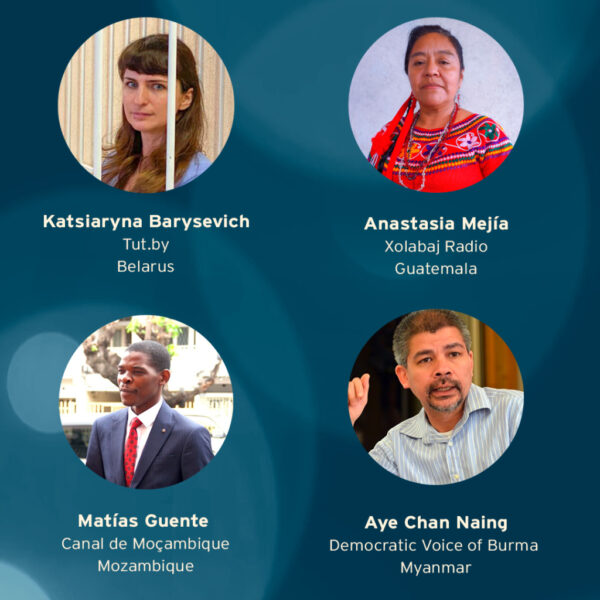
- “Nicaragua’s most prominent journalist has fled the country for a second time after police raided his house during a widening crackdown on opposition figures by the country’s Sandinista rulers,” Wilfredo Miranda reported Tuesday for the Guardian from the capital, Managua. “Carlos Fernando Chamorro, the editor of the Confidencial website and a member of one of the country’s most influential political families, said on Tuesday he had left the Central American country to ‘safeguard his freedom. ‘I demand an end to this police harassment,’ Chamorro tweeted. ‘Reporting the truth is not a crime.’ . . .”
- “A New York Times journalist was denied entry into Nicaragua on Thursday amid a nationwide crackdown against the media and civil society in the Central American nation,” Oscar Lopez reported for the Times. “Anatoly Kurmanaev, who recently joined the Times’s Mexico City bureau after years covering Venezuela, had his ticket to Managua canceled by the airline he was traveling on hours before the flight was set to take off, after Nicaraguan authorities refused to grant him entry. Mr. Kurmanaev had met all of Nicaragua’s legal and health requirements for entry. . . .”
- “The former mayor of Chínipas, Chihuahua, Hugo Amed Schultzm was sentenced to 8 years in prison for his responsibility in the murder of journalist Miroslava Breach, which occurred in March 2017,” Mexico’s Animal Politico reported June 16.
- “The Director-General of UNESCO, Audrey Azoulay, has condemned the killing of journalist Gustavo Sánchez Cabrera, who was shot dead on 17 June in Mexico’s state of Oaxaca,” UNESCO announced Monday. “Sánchez Cabrera, director of the digital newspaper Noticias Minuto a Minuto, was shot while travelling on a motorcycle on a road connecting San Vicente and Morro Mazatán. Specializing in local politics, Sánchez Cabrera had received violent threats in the past and had survived an armed attack in July 2020. . . .”
- “Apple Daily, a popular newspaper in Hong Kong, has long needled Beijing with its rambunctious support of pro-democracy protesters, aggressive investigations of officials and lampooning of China’s Communist Party leadership. Now China has effectively silenced the paper — and along with it, one of its most defiant critics,” Austin Ramzy and Tiffany May reported on Wednesday for The New York Times. “Apple Daily said on Wednesday that it was closing less than a week after the police froze its accounts, raided its offices and arrested top editors, as the government’s escalating campaign against dissent takes aim at the city’s once vaunted media freedoms.”
- “A West African court has restrained the Nigerian government from ‘unlawfully’ prosecuting people from using Twitter, while it is considering a legal action launched by activists and journalists seeking to reverse a ban on the social media giant,” Al Jazeera reported Tuesday. “Authorities in early June indefinitely suspended Twitter, two days after the platform removed a post from President Muhammadu Buhari that threatened to punish regional secessionists, which Twitter said violated its rules.”
To subscribe at no cost, please send an email to journal-isms+subscribe@groups.io and say who you are.
Facebook users: “Like” “Richard Prince’s Journal-isms” on Facebook.
Follow Richard Prince on Twitter @princeeditor
Richard Prince’s Journal-isms originates from Washington. It began in print before most of us knew what the internet was, and it would like to be referred to as a “column.” Any views expressed in the column are those of the person or organization quoted and not those of any other entity. Send tips, comments and concerns to Richard Prince at journal-isms+owner@
View previous columns (after Feb. 13, 2016).
View previous columns (before Feb. 13, 2016)
- Diversity’s Greatest Hits, 2018 (Jan. 4, 2019)
- Book Notes: Is Taking a Knee Really All That? (Dec. 20, 2018)
- Book Notes: Challenging ’45’ and Proudly Telling the Story (Dec. 18, 2018)
- Book Notes: Get Down With the Legends! (Dec. 11, 2018)
- Journalist Richard Prince w/Joe Madison (Sirius XM, April 18, 2018) (podcast)
- Richard Prince (journalist) (Wikipedia entry)
- February 2018 Podcast: Richard “Dick” Prince on the need for newsroom diversity (Gabriel Greschler, Student Press Law Center, Feb. 26, 2018)
- Diversity’s Greatest Hits, 2017 — Where Will They Take Us in the Year Ahead?
- Book Notes: Best Sellers, Uncovered Treasures, Overlooked History (Dec. 19, 2017)
- An advocate for diversity in the media is still pressing for representation, (Courtland Milloy, Washington Post, Nov. 28, 2017)
- Morgan Global Journalism Review: Journal-isms Journeys On (Aug. 31, 2017)
- Diversity’s Greatest Hits, 2016
- Book Notes: 16 Writers Dish About ‘Chelle,’ the First Lady
- Book Notes: From Coretta to Barack, and in Search of the Godfather
- Journal-isms’ Richard Prince Wants Your Ideas (FishbowlDC, Feb. 26, 2016)
- “JOURNAL-ISMS” IS LATEST TO BEAR BRUNT OF INDUSTRY’S ECONOMIC WOES (Feb. 19, 2016)
- Richard Prince with Charlayne Hunter-Gault,“PBS NewsHour,” “What stagnant diversity means for America’s newsrooms” (Dec. 15, 2015)
- Book Notes: Journalists Follow Their Passions
- Book Notes: Journalists Who Rocked Their World
- Book Notes: Hands Up! Read This!
- Book Notes: New Cosby Bio Looks Like a Best-Seller
- Journo-diversity advocate turns attention to Ezra Klein project (Erik Wemple, Washington Post, March 5, 2014)


